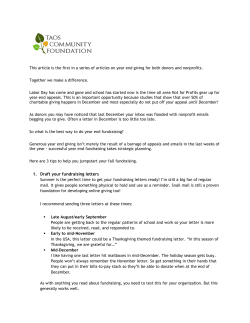
A Can we apply Colin Powell’s 13 rules?
building a business Can we apply Colin Powell’s 13 rules? A pril marked the 15th anniversary of America’s Promise, an organization guided by the principle that all children deserve the fundamental resources needed to grow into healthy, independent, and responsible adults. Those resources, called the “five promises,” are caring adults, safe places, a healthy start, effective education, and the opportunity to help others. Today America’s Promise claims to be the nation’s largest multi-sector alliance focused on the wellbeing of young people. It boasts a collaboration of more than 400 partners representing business, nonprofits, communities, and policy makers. See www. americaspromise.org. America’s Promise was founded by retired Gen. Colin Powell, a man who continues to credit education for opening the doors of opportunity in his life. Born in Harlem to Jamaican immigrants, he was educated in New York City public schools and rose in the ranks of the military to become its highest ranking officer (chairman of the Joint Chiefs of Staff) and later presided over foreign affairs as U.S. secretary of state. Gen. Powell reflects on his life experiences in his latest book, It Worked for Me: In Life and Leadership. He offers 13 rules formulated during his career in public service, both the military and the government, as well as his wandering through life. His observations may prove useful to anyone in a leadership or management role as well as to young people just starting their careers. Here are those rules, elaborated in hypothetical scenarios for those dedicated to the care and education of young children. 1 It ain’t as bad as you think! It will look better in the morning. Budget projections for the summer look grim. A decline in enrollment will lower revenue, the utility company has increased rates, and teachers expect a pay raise. How will you manage? You have a choice: Throw up your hands and gripe or figure out a solution. Such challenges shake us out of complacency and force us to become creative. We can review the situation with fresh eyes a little later, brainstorm with trusted friends and colleagues, use available resources, negotiate where possible, and seek counsel outside ourselves. What looks bad today may not be so tomorrow. 2 Get mad and then get over it. A studentvolunteer, eager to be helpful, offers to install new software on the office computer. Recognizing that it could save time and money, you agree. By late afternoon, however, the student indicates something has gone wrong. Instead of installing new software, he has erased the hard drive. “You did what?” you exclaim. The next day you hire a data recovery consultant who can undo most of the damage. With help from staff and paper records, the computer is up and running again. You’re courteous to the student, realizing that a similar disaster might just as easily have happened had the computer been stolen, attacked by a virus, or knocked out by a power failure. You arrange for a secure and redundant backup system to avoid a similar problem in the future. 3 Avoid having your ego so close to your position so that when your position falls, your ego goes with it. You’re appointed chair of the fundraising committee for a nonprofit organization that serves children with disabilities. Committee members suggest hosting the organization’s usual series of fundraising events such as a marathon, a silent auction, and a dinner with a © Texas Child Care quarterly / summer 2012 / VOLUME 36, NO. 1 / childcarequarterly.com celebrity as speaker. But you insist that XYZ Foundation will provide a grant of $25,000 or more to achieve the goal. When the foundation responds, you are chagrined to read that the foundation has shifted its emphasis to funding technology in the public schools. If your ego has been enmeshed with the grant proposal, you may feel that the rejection is aimed at you. But if you approach fundraising as a task separate from yourself, you can more readily reassess the possibilities and move ahead. Your position is a stance you take, not who you are. 4 It can be done! You’ve graduated from high school and dream of becoming a teacher. How will you manage to get a college degree? “We’d like to send you to college, but we can’t afford it,” your parents say. “Let’s get married,” your boyfriend says. “Only smart people go to college,” says a neighbor. But Gen. Powell would argue: “It can be done.” He should know. He overcame poverty, prejudice, and C-average grades in high school to graduate from City College of New York. It was in college ROTC that he found his calling and launched a successful career. “A dream doesn’t become reality by magic,” he has said. “It takes sweat, determination and hard work.” 5 Be careful whom you choose. You’ve received only one application for the job of after-school coordinator. The ad ran later than you wanted, response has been sparse, and you’re tired of filling the vacant position yourself. You need to check the applicant’s references, but it’s late in the day. You’re tempted to call the applicant and get him to start work tomorrow. But you reconsider. You decide to check references tomorrow and then invite the applicant to come in and work with the after-school group in person to observe how he handles them. You remember that the people you choose represent you—your morals, character, goals, and energy. 6 Don’t let adverse facts stand in the way of a good decision. A local college has asked your child development department to assist in organizing a rural clinic where the college plans to send its nurses in training. In discussing the pros- pect with the business office, you listen to facts about the recession, the distance to the rural community, rising gasoline prices, and the language barrier. At the same time, you investigate the needs of your own students and staff. They could use experience in observing and working with children, for example. They are always looking for research ideas. They need practice communicating in another language. They are familiar with technology and could use videoconferencing to interact with nurses and parents. “If you have 40 to 70 percent of the information, you probably have what you need,” Gen. Powell has said. “Take a chance, do something. Go with your gut instinct.” He believes that if you wait for all the information to make a decision, you might miss out on an opportunity. 7 You can’t make someone else’s decisions! You shouldn’t let someone else make yours. As board chair of a nonprofit organization that serves indigent substance abusers, you hold the deciding vote on shutting down the agency. “So what if we’ve lost funding from the county and United Way?” asks one board member. “We can find other funders.” “We can’t just close our doors,” says another. “Where will our clients go?” “We’ve worked so hard,” says another. “We can’t quit now.” You know that staying open even a month longer will incur debts that will be impossible to repay. You believe the agency might be able to merge with another nonprofit, or find other—though less than ideal— resources for clients. You listen to other board members’ perspectives and express appreciation for their views. Ultimately, however, you make the decision. 8 Check small things. You’re reviewing a list of resources for parents that you plan to post on the school website. It’s a typical day, which means you get interrupted every five minutes by a phone call or a question from staff. Each time, you lose your train of thought. Finally, you finish the review and initial the list to indicate it’s ready to post. But your intuition tells you to have someone else proof it. You e-mail it to a friend who edits the professional education association newsletter. An hour later, she sends it back, having corrected the phone number of the employment assistance office. You think: “A phone number is a © Texas Child Care quarterly / summer 2012 / VOLUME 36, NO. 1 / childcarequarterly.com small thing, but this correction may have saved us hours of time and effort later on, not to mention credibility.” 9 Share credit. You’ve been nominated for a teacher of the year award by the local professional education association. You’re flattered and immediately begin to imagine what you’ll say from the podium at the awards luncheon. Then you recall how overwhelmed you felt on your first day on the job several years ago. When you were almost ready to burst into tears, the director came in and separated the two boys fighting over the blocks and engaged them in playing with clay. Later a fellow teacher explained how she conducted parent conferences, which you adapted for your own. Other memories come to mind: how an aide put her whole heart into reading The Velveteen Rabbit, how a consultant clarified child assessment, and how a parent taught you a Spanish children’s song. It becomes abundantly clear how much you’ve learned from others who have counseled you and served as role models, and you resolve to acknowledge their help and support. 10 Remain calm. Be kind. It’s another one of those stressful mornings. Four-year-old Nathan has come to school hungry, Bethany’s dad has lost his job, the teacher of the 3-year-olds has had another fight with her husband, and your accountant is waiting to see you. always show more kindness than seems necessary. You wave to the accountant, have the cook make a breakfast taco for Nathan, invite the teacher for a cup of tea when naptime comes, and make a note to talk to Bethany’s parents. When you sit down with the accountant, you are calm and poised. “Always show more kindness than seems necessary,” Gen. Powell has said, “because the person receiving it needs it more than you will ever know.” 11 Have a vision. Be demanding! This morning’s local newspaper reports on a proposal for a public health clinic in the low-income neighborhood where you work. City council members are divided about the need for the clinic, skeptical of finding funds to pay for it, and unsure about how to proceed. Because you work in the neighborhood, you come face to face with families every day. You worry about mothers having more children than the family can afford, babies left in the care of siblings, children getting infectious diseases, and grandparents going without the eyeglasses or hearing aids they need. You begin to imagine what a health clinic might do for the neighborhood. You envision how the clinic could collaborate with the elementary school where you work. You remember reading about how residents in another neighborhood formed a watch group that chased out drug dealers. You see how a local church might offer its classrooms for a preschool program, and a local landscaping business might donate the tools necessary to turn a vacant lot into a community garden. Gradually you form a clear picture of what needs to be done. You begin talking informally to community leaders, and you form a steering committee to urge a city council member to call for a public hearing. As a group, you survey neighborhood organizations and drum up support from local media. You parse out responsibilities and then you hold yourself and others accountable. At every step, you state your vision and demand action. 12 Don’t take counsel of your fears or naysayers. The director suggests that you give a presentation on art activities for toddlers at an upcoming workshop. You panic: “I’ve never spoken in public before. Nobody wants to listen to me. What would I say?” Co-workers are no help: “The people who come to that workshop are super critical,” whispers one. “Just say you can’t do it,” says another. The director takes you aside: “This is an opportunity to grow professionally.” “But I’m too scared,” you whimper. She looks you squarely in the eye: “F-E-A-R stands for False Events Appearing Real.” You soften. “That workshop session lasts 45 minutes,” she continues, “which is just enough time to demonstrate the finger painting activity I saw you doing last week.” © Texas Child Care quarterly / summer 2012 / VOLUME 36, NO. 1 / childcarequarterly.com “Well, that activity is easy—and fun, too” you think. You begin picturing the materials you will need. Suddenly you get an idea: “Photos! I could take pictures of my class finger painting and show them in a PowerPoint presentation.” “Good idea,” the director says. 13 Perpetual optimism is a force multiplier. For the past three years, you have volunteered with the health resources fair at your church. You have handled the publicity and marketing for the event, and each year the attendance has grown. This year your schedule forces you to share the publicity duties with another volunteer. You give her the list of agencies and organizations to contact, and you begin preparing information for neighborhood newsletters. A month before the fair, you telephone your coworker, only to find she has done nothing with the list. “I don’t know anybody at these agencies,” she says, “and I don’t know what to say.” You meet her for coffee and explain how important the health resources are to low-income families. You discuss how attendance has grown at the event, and how much the volunteer doctors and dentists enjoy participating. You review the list of agencies and role play a conversation. “As you dial a phone number, put a smile on your face,” you say. “Expect the person at the other end to be happy you called.” Enthusiasm is contagious. When you speak and act with confidence, others react in the same fashion. Your optimism, grounded in a purpose you feel passionate about and forged within a solid plan that you put into action, will grow and multiply. The leader in all of us Gen. Powell’s rules might be condensed into a few simple phrases, such as “Stay positive” and “Have courage.” He developed his philosophy by following his calling, working hard, and holding to his principles. “I didn’t start out to be a general,” he has said. “I wanted to be a soldier.” If leadership means the ability to influence others, then anyone who works in child care and early education is a leader. n © Texas Child Care quarterly / summer 2012 / VOLUME 36, NO. 1 / childcarequarterly.com
© Copyright 2025





















